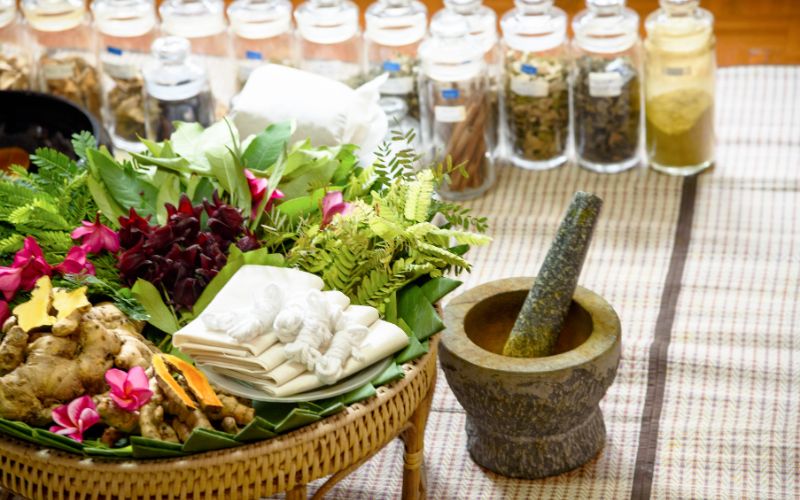Ever wondered about the TCM vs Ayurveda? These ancient health systems are like the OGs of wellness, passed down through generations.
They’ve got some similarities, but also some key variations. So, if you’re curious about which one might be right for you, stick around as we dive into the world of TCM vs Ayurveda
What is Traditional Chinese Medicine (TCM)?

Traditional Chinese Medicine (TCM) is a comprehensive system of healthcare that has been practiced for thousands of years in China and other parts of East Asia. Rooted in ancient philosophical and medical traditions, TCM offers a holistic approach to health and wellness that encompasses the body, mind, and spirit.
Philosophical Foundations: At the core of TCM lies a unique understanding of the human body and its relationship with the surrounding environment. TCM is guided by principles derived from ancient Chinese philosophies, including Taoism and Confucianism, which emphasize the interconnectedness of all things and the importance of living in harmony with nature.
Key Concepts: TCM employs several key concepts to understand health and disease:
- Qi (pronounced “chee”): Qi is often translated as “vital energy” or “life force” and is believed to flow through the body along specific pathways known as meridians. The balance and smooth flow of Qi are essential for maintaining health, while blockages or imbalances can lead to illness.
- Yin and Yang: Yin and Yang represent complementary forces that exist in dynamic balance within the body and the universe. Health is viewed as a state of harmonious balance between Yin and Yang energies, while disease arises from their imbalance.
- Five Elements: TCM categorizes physiological processes and phenomena into five elemental categories—Wood, Fire, Earth, Metal, and Water—which correspond to different organs, tissues, emotions, and seasons. The interactions between these elements influence health and well-being.
Diagnostic Methods: In TCM, diagnosis is based on a comprehensive assessment of the individual’s symptoms, medical history, lifestyle factors, and subtle physiological indicators such as pulse diagnosis and tongue examination. Practitioners aim to identify patterns of disharmony or imbalance within the body’s energy systems and organs, known as Zang-Fu organs.
Therapeutic Modalities: TCM offers a diverse array of therapeutic modalities aimed at restoring balance and promoting health:
- Medicinal acupuncture: This practice utilizes the insertion of tiny needles into particular locations along the meridians of the body in order to control the circulation of qi and to promote the body’s inherent capacity to cure itself.
- Herbal Medicine: Herbal remedies, comprising thousands of medicinal substances derived from plants, minerals, and animal products, are prescribed to address a wide range of health conditions and imbalances.
- Dietary Therapy: TCM dietary therapy emphasizes the importance of consuming foods that support one’s constitution and address specific health concerns. Certain foods are classified according to their energetic properties (e.g., warming, cooling) and are prescribed accordingly.
- Tui Na (Chinese Massage): Tui Na is a form of therapeutic massage that involves various manual techniques, including kneading, pressing, and stretching, to manipulate the body’s Qi and promote circulation and relaxation.
- QiGong and Tai Chi: QiGong and Tai Chi are mind-body practices that incorporate movement, breathwork, and meditation to cultivate Qi, improve vitality, and enhance overall well-being.
Holistic Approach: TCM takes a holistic approach to health and wellness, recognizing the interconnectedness of body, mind, and spirit. It aims to address the underlying causes of illness and disharmony rather than simply treating symptoms, with a focus on promoting balance, harmony, and vitality on all levels.
What is Ayurveda?

Ayurveda, originating from the Indian subcontinent, is an ancient holistic healing system with a profound philosophy of health and wellness. Its name, derived from Sanskrit, translates to the “science of life” or the “knowledge of longevity.”
Ayurveda encompasses a comprehensive understanding of human health, drawing from ancient wisdom and natural principles.
Philosophy of Balance: At the heart of Ayurveda lies the belief that optimal health arises from achieving balance and harmony among the body, mind, and spirit. This holistic approach highlights the significance of nourishing each dimension to achieve overall well-being and acknowledges the interdependence of all facets of an individual’s life.
Doshas: Central to Ayurvedic philosophy are the doshas, which represent the fundamental energies that govern various physiological and psychological functions within the body. There are three primary doshas:
- Vata, composed of air and space elements, governs movement and communication.
- Pitta, consisting of fire and water elements, regulates metabolism and digestion.
- Kapha, comprising earth and water elements, governs structure and stability. Each individual possesses a unique combination of these doshas, known as their Prakriti, which determines their physical and mental constitution.
Practices and Therapies: Ayurveda offers a diverse array of practices and therapies aimed at maintaining and restoring balance within the body and mind.
These include:
- Dietary Recommendations: Ayurvedic dietary guidelines emphasize the importance of consuming wholesome, nourishing foods that align with an individual’s doshic constitution. Specific dietary recommendations are provided to pacify or balance each dosha, promoting digestive health and overall vitality.
- Herbal Remedies: Ayurvedic medicine utilizes a wide range of herbs and botanicals to support various aspects of health and well-being. Herbal formulations are carefully crafted to address specific imbalances or health concerns, offering natural alternatives to conventional pharmaceuticals.
- Yoga and Meditation: Yoga and meditation practices play a central role in Ayurveda, serving as powerful tools for promoting physical, mental, and emotional balance. Yoga asanas (postures) and pranayama (breathing techniques) are employed to strengthen the body, calm the mind, and enhance the flow of prana (life force energy) throughout the system.
- Detoxification Procedures: Ayurvedic detoxification techniques, known as Panchakarma, are employed to cleanse and rejuvenate the body at a deep level. These procedures include therapies such as oil massage (Abhyanga), herbal steam therapy (Swedana), and therapeutic enemas (Basti), which help to remove accumulated toxins and restore the body’s natural equilibrium.
- Lifestyle Adjustments: Ayurveda recognizes the profound impact of lifestyle choices on health and well-being. Therefore, it offers personalized recommendations tailored to an individual’s unique constitution and needs. These recommendations may include guidelines for daily routines (Dinacharya), sleep hygiene, stress management techniques, and mindful living practices.
Personalized Approach
One of the distinguishing features of Ayurveda is its emphasis on personalized medicine. Rather than adopting a one-size-fits-all approach, Ayurvedic practitioners take into account the individual’s unique constitution, imbalances, and lifestyle factors when formulating treatment plans.
By addressing the root causes of illness and tailoring interventions to suit each person’s specific needs, Ayurveda aims to promote long-lasting health and vitality.
Interconnectedness with Environment:
Ayurveda recognizes that human health is intimately connected to the surrounding environment, including factors such as climate, seasons, and daily routines. By harmonizing one’s lifestyle with the natural rhythms of nature, individuals can optimize their health and well-being.
Ayurvedic wisdom guides individuals to align their daily activities, dietary choices, and self-care practices with the prevailing environmental influences, fostering a deeper sense of connection and balance.
Differences Between Ayurveda and TCM
While TCM and Ayurveda both focus on restoring balance and promoting health, there are some key differences between the two systems.
One major difference is in their underlying philosophies.
TCM is based on the concept of Qi and the balance of Yin and Yang, while Ayurveda focuses on balancing the three doshas – Vata, Pitta, and Kapha. These different frameworks shape how each system diagnoses and treats disease.
Another difference lies in their diagnostic tools.
TCM practitioners may use techniques such as pulse diagnosis, tongue examination, and questioning to assess a patient’s condition. In contrast, Ayurvedic practitioners often rely on techniques like pulse diagnosis, tongue examination, and observation of bodily characteristics to determine imbalances in the doshas.
In terms of treatment modalities, TCM utilizes acupuncture, herbal medicine, massage, dietary therapy, and exercise to restore balance and promote healing.

Ayurveda, on the other hand, uses herbal remedies, dietary guidelines, lifestyle practices, and cleansing techniques to address imbalances in the doshas.
Another key difference is in the use of medicinal plants. TCM relies heavily on Chinese materia medica, which consists of a wide range of herbs and plant-based substances. Ayurveda also utilizes a variety of medicinal plants unique to the Indian subcontinent.
While both TCM and Ayurveda have been practiced for centuries and continue to be popular forms of traditional medicine around the world, there is ongoing debate about their effectiveness in treating disease.
Ultimately, the choice between TCM and Ayurveda comes down to personal preference and what works best for each individual. Some people may find relief from chronic health issues through acupuncture or herbal remedies, while others may benefit from dietary changes or lifestyle practices recommended by Ayurvedic practitioners.
Regardless of which system of medicine you choose, it’s important to consult with a qualified practitioner who can provide personalized treatment based on your unique health needs.
Both TCM and Ayurveda offer holistic approaches to wellness that focus on restoring balance in the body and promoting overall health.
Consider Natural Healing TCM Wellness Classes for Enhanced Wellness
Consider Natural Healing TCM Wellness Classes for Better Wellness for Only TCM Treatments
If you are considering traditional Chinese medicine (TCM) treatments as a path to wellness, you may also want to explore the option of taking Natural Healing TCM Wellness classes.
These classes can provide valuable insights into the principles and practices of TCM, helping you to better understand how this ancient system of medicine can promote overall health and well-being.
By enrolling in TCM wellness classes, you can learn about the fundamental concepts of TCM, such as Qi, Yin and Yang, and the meridian system. You can also gain practical knowledge about how to use techniques like acupressure, herbal medicine, dietary therapy, and massage to restore balance in the body and treat various health conditions.
Additionally, TCM wellness classes can teach you how to incorporate TCM principles into your daily life, including tips on maintaining a balanced diet, managing stress, and staying active.
By learning these practices, you can enhance the effectiveness of TCM treatments and support your overall well-being.
Get In touch with a qualified TCM practitioner to discuss the benefits of incorporating Natural Healing TCM Wellness classes into your wellness routine. With a holistic approach to health and wellness, you can take steps towards achieving optimal health and balance in both mind and body through traditional Chinese medicine.
Conclusion
When considering traditional medicines such as TCM and Ayurveda, it’s important to understand that each system offers a unique approach to healing based on centuries-old practices and philosophies.
While TCM focuses on the concepts of Qi, Yin, and Yang to restore balance in the body, Ayurveda uses the doshas to address imbalances and promote overall health.
In terms of diagnostic tools, TCM practitioners may use techniques like pulse diagnosis and tongue examination to assess a patient’s condition.
On the other hand, Ayurvedic practitioners rely on similar methods along with observation of bodily characteristics to determine imbalances in the doshas.
Both systems emphasize the importance of personalized assessment and treatment plans tailored to individual needs.
When it comes to treatment modalities, TCM utilizes acupuncture, herbal medicine, massage, dietary therapy, and exercise to restore balance and promote healing.
Ayurveda, on the other hand, uses herbal remedies, dietary guidelines, lifestyle practices, and cleansing techniques to address imbalances in the doshas.
Ultimately, the choice between TCM and Ayurveda depends on personal preferences and what works best for each individual. It’s important to consult with a qualified practitioner who can provide personalized treatment based on your unique health needs.
Both TCM and Ayurveda offer holistic approaches to wellness that focus on restoring balance in the body and promoting overall health.
FAQs Related to TCM vs Ayurveda
Both TCM and Ayurveda are effective in treating a variety of chronic health conditions. The choice between the two systems ultimately depends on the individual’s preferences and needs. Some people may find relief from acupuncture or herbal remedies used in TCM, while others may benefit from dietary changes and lifestyle practices recommended by Ayurvedic practitioners.
The main differences between TCM and Ayurveda lie in their underlying philosophies, diagnostic tools, treatment modalities, and use of medicinal plants. TCM focuses on Qi, Yin, and Yang balance, while Ayurveda uses the concept of doshas. Each system has unique approaches to diagnosing and treating disease.
While it is possible to combine elements of both TCM and Ayurveda in a treatment plan, it is important to consult with qualified practitioners from each system to ensure that the treatments are compatible and will not have any adverse effects. Both TCM and Ayurveda offer holistic approaches to wellness, so integrating aspects of both systems may provide comprehensive care for certain health conditions.

















